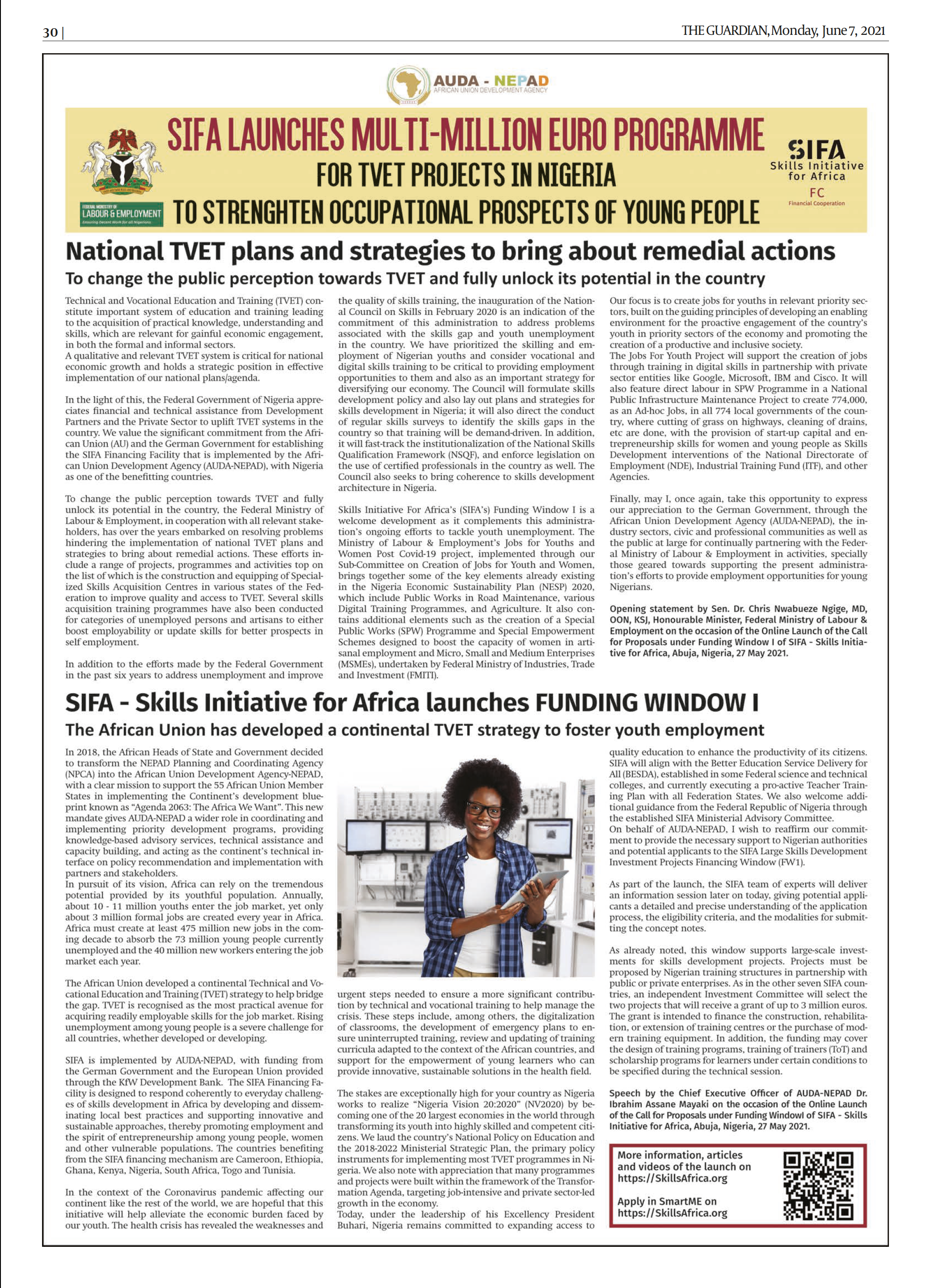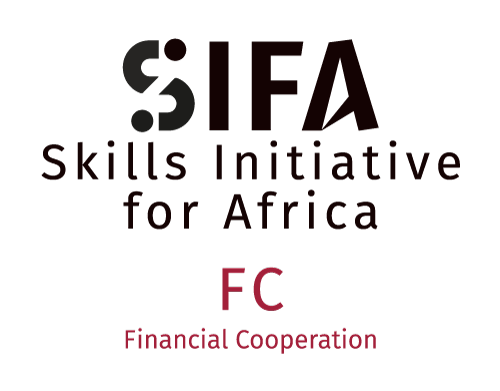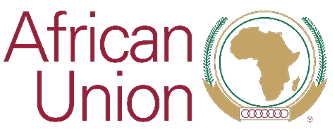
In THE GUARDIAN and THE PUNCH
Published in THE GUARDIAN and THE PUNCH, Abuja, Nigeria


Download pdf here Nigeria_The_Guardian_-JUNE20210607
Please read the valuable contributions by several stakeholders, in addition to the printed articles.
SIFA Funding Window I - A window of opportunity for TVET in Nigeria
The primary functions of the National Board for Technical Education (NBTE) are to advise the Federal Government of Nigeria on, and coordinate all aspects of technical and vocational education (TVE) falling outside the universities; determine the skilled manpower needs of the country in the industrial, commercial and other relevant fields and prepare periodic master plans for the balanced and coordinated development of polytechnics and similar tertiary technical institutions.
Recent acts have extended the functions of NBTE to include the establishment and maintenance of minimum standards in polytechnics and other technical institutions and the accreditation of academic programmes in all TVE institutions for the purpose of award of national certificates, diplomas and other similar awards.
The NBTE intends to revive its zonal offices to carry out advocacy on skills and interface with industries and other agencies on skills development; in addition, model skills centres would also be set up in the country’s 6 geopolitical zones in collaboration with industry. The Board will also register a consultancy company that will deliver training and other services to clients in order to generate internally generated revenue to fund some of its activities.
The NBTE has had a close relationship with AUDA-NEPAD and SIFA over the past few years and is pleased that Funding Window 1 has finally been launched in Nigeria. This initiative will provide models for other public-private partnerships between TVET institutions and the private sector with the attendant scale up and multiplication of employment opportunities for young Nigerians.
Prof. Idris M Bugaje, Executive Secretary, National Board for Technical Education (NBTE)
Concerted Efforts!
The launching of the SIFA Window I in Nigeria is indeed a most welcome development. NACCIMA is of the firm opinion that the Initiative will have the desired impact in the quest to walk the talk in harnessing the potentials of TVET in the concerted efforts to provide opportunities and curb the rising rate of unemployment and consequently insecurity. It will also help to enhance the productive capacity of MSMEs which essentially make significant contributioon to GDP. We are fully in support of this funding initiative as the engagement continues with the private sector.
Ambassador Ayoola Olukanni, Director-General, Nigerian Association of Chambers of Commerce, Industry, Mines & Agriculture (NACCIMA)
TVET to tackle the mismatch between industry needs and available skills
The high unemployment rate in Nigeria among other issues has negatively impacted the economy, hampered national security and socio-economic development. Nigeria is the most populous Country in Africa with a population of over 200 million people. Nigeria has a large youth population with high demand for educational opportunities. The National Bureau of Statistics (NBS) report reveals that, Nigeria’s unemployment rates increased to 33.3% in Q4 2020 from 27.1% in Q2 2020. The incidents of youth restiveness in the country, the global pandemic and economic crisis have drawn the attention of the government, all stakeholders and the international community to the worsening challenge of youth unemployment and underemployment in Nigeria.
The mis-match between industry needs and the available skills among youths has been a concern of the Nigerian government. These challenges have greatly renewed governments commitment to curb the high levels of unemployment through sustainable strategies and policies that empower the youths to acquire relevant skills to attain self-reliance.
The Skills Initiative for Africa (SIFA) is an initiative of the African Union Commission (AUC) and the African Union Development Agency (AUDA-NEPAD) supported by the German Government and the European Union to strengthen occupational prospects of young people in Africa.
The SIFA Funding Window I which is being launched in Nigeria, aims at building employment-oriented skills development projects, led by international companies, in collaboration with domestic training providers. The project is designed to achieve global quality on skills standard to improve youth employability in priority growth sectors. The window supports smaller investment projects that build the capacity of public and private training institutions to deliver innovative skills program for youth employment. Funding Window I of SIFA offers Grant amounts to institutions per project and portents great benefits for participating African countries.
The Nigeria Employers’ Consultative Association (NECA) has been actively involved in TVET in Nigeria, in collaboration with relevant government agencies in the public and private sectors of the economy. NECA appreciates the support of the German government and their commitment towards building TVET in Nigeria. We value the pivotal role of the European Union, SIFA, AUC, AUDA-NEPAD and the Federal Ministry of Labour and Employment, Nigeria, in strengthening occupational prospects of young people in Africa. The urgent and collective effort of all stakeholders is imperative to invest and build the TVET frameworks and sustainable models that have the potential to turn the challenge into opportunities for our country.
Over the years, research findings on required skills in the Nigerian economy, environmental effects and labour market information have revealed dearth of Technical and vocational skills in the country. Organisations in the private sector have complained about skills gaps in meeting their manpower requirements for a long time. Organisations have blamed the problem on emphasis on paper qualification over hands-on technical and vocational skills and in addition the available skills by the youths do not match the technical and vocational requirements of industries and the country.
Quality Technical and Vocational Education and Training (TVET) is widely recognized as having an important role to play in tackling youth unemployment. It is, therefore, imperative for our country to develop the critical and required Technical and vocational trade areas to meet the identified needs of industries and the country.
Dr. Timothy Olawale, Director-General Nigeria Employers’ Consultative Association (NECA)
Opportunity to Develop Sustainable Partnerships
The Industrial Training Fund (ITF) was established in 1971 as a specialist Training and Manpower Development Agency of the Federal Government, to provide skills and services for the development of skilled manpower for industry and commerce. The ITF’s Statutory Functions are to:
- Provide, promote and encourage the acquisition of skills in Industry and Commerce required for national economic development.
- Set training standards in all sectors of the of the economy and monitor adherence;
- Evaluate and certify vocational skills acquired by apprentices, craftsmen and technicians with relevant organizations
Some of ITF’s Intervention Programmes include:
- National Industrial Skills Development Programme
- Women Skills Empowerment Programme
- Agric-preneur
- Graduate Up-Skilling
- InfoTech Skills Empowerment Programme
The ITF appreciates the introduction of SIFA’s Funding Window 1 in Nigeria and regards this as a unique opportunity for TVET providers and corporate organisations to develop sustainable partnerships that will further strengthen vocational training and skills development in the country.
Sir Joseph Ari, Director-General/Chief Executive, Industrial Training Fund (ITF)
Strong engagement with the Private Sector
Federation of Construction Industry, FOCI, is a Trade Union, Advocacy and Representation Group for Employers in Construction and related Industries in Nigeria. As Employers, we often observe a mismatch between the competencies/skills we require and those available in the Labour Market. FOCI recently launched a Construction Skills Academy to provide the needed training. FOCI embraces the following opportunities in the TVET initiative: Enables young people to “earn while they learn”. Young people should be encouraged to consider TVET as an easier and quicker route to self-dependence and self-employment. Provides skilled and sufficiently employable persons who add value to their Employers. This would curb the menace of high unemployment and improve job growth in the formal sector, thereby create opportunities for more Nigerians to gain employment. FOCI is delighted to participate in the launch of the SIFA Funding Window to Foster Youth Employment.
Surely, tomorrow starts now!
Engr. Nasiru Dantata, President, Federation of Construction Industry
Skilled workers for sustained growth!
TVET can match the requirements of the labour market
Africa is a young continent with almost 60% of its population under the age of 25 years.
Undoubtedly, the youth are Africa’s biggest economic resource, and this is an important opportunity to help boost economic growth and development. However, it creates also a continental challenge on youth and employment. More than 10 million young people enter the labor market each year. We see a growing level of youth unemployment. The number of formal jobs available is limited and leaves the majority of the youth unemployed or forces them to settle for low-paid and low productive jobs in the informal sector. Insufficient or inappropriate training, that does not match the requirements of the labour market also contribute to that fact.
Moreover, the emergence of the COVID-19 pandemic has exacerbated the rise of the unemployment rate globally. At the same time, there is a huge potential as industries need well-educated workers for sustained growth! The African Union Commission and Germany – the Federal Ministry for Economic Cooperation and Development (BMZ) - have therefore intensified cooperation in the field of education and employment, by establishing the Skills Initiative for Africa (SIFA). Germany has made available 88 million EUR for the Project, complemented by funds from the European Union and the Member States of the African Union.
As part of the Skills Initiative, the African Union Development Agency (AUDA-NEPAD) and KfW – the German Development Bank - have set up a Financing Facility to provide funding for improved, innovative TVET approaches across the continent – which we are glad to launch today also in Nigeria! The Financing Facility is implemented by AUDA-NEPAD with funding from Germany through KfW. We would like to take this occasion to thank AUDA-NEPAD for the excellent collaboration on this Project. We are particularly proud to be one of the major partners on this important project with AUDA which has been officially confirmed by the African Union as the implementing agency of the African Union Commission.
What’s the next step? Today, AUDA-NEPAD and the Government of Nigeria launch the call for proposals under Funding Window I of the Financing Facility. Grants will be provided on a competitive basis for the best project proposals. So please feel encouraged to apply, if your training institution, company or agency wants to implement a TVET project that combines the knowhow from employers and training institutes, from the public as well as from the private sector.
Please apply for funding, if your project harnesses local know-how as well as international best practices by cooperating with local and with international actors, strengthens your sustainable business model and creates more and better employment perspectives particularly for women and girls. It is worth the effort: the winner will be granted up to 3 Million EUR for infrastructure, equipment and further needs of your training facility. Congratulations to Nigeria for having been selected as one of the eight beneficiary countries under the Skills Initiative.
Speech by Christoph Tiskens, KfW Development Bank, Director for Eastern Africa & African Union on the occasion of the Online Launch of the Call for Proposals under Funding Window I of SIFA - Skills Initiative for Africa, Abuja, Nigeria, 27 May 2021. Video available here.
Partnerships for sustainable income-generating employment for Nigerian Youths
Nigeria accounts for about half of West Africa’s population and has one of the largest populations of youth in the world. Over 40% of Nigerian youth are unemployed or underemployed which can be attributed to the lack of adequate qualified manpower. The major reason for this is the poor quality of curricula, teacher training, and equipment in the Technical and Vocational Education and Training (TVET) educational system that do not correspond to the needs of the labour market.
The German Federal Ministry of Economic Cooperation and Development by commissioning the project Skills Development for Youth Employment (SKYE) implemented by GIZ, supports Nigeria to improve the quality of its TVET system. TVET plays a crucial role in supporting Nigerian youth to find a job in the formal and informal economy, especially as there is a high demand for qualified labour on the medium level of qualification. This is particularly true for booming sectors like construction and agriculture.
To make TVET an instrument that successfully brings youth into jobs, training needs to be of good quality and aligned with the labour market requirements. Therefore, SKYE tackles quality issues in the TVET system on various levels, first by working on the framework conditions and through improving the TVET policies and strategies. Furthermore, the development of vocational training standards with the strong involvement of private sector representatives can help align the standards with the needs of the labour market. By doing organisational development and capacity building of staff of TVET organisations, the quality of training delivery can be improved.
In addition, through a cooperative approach and partnerships with the private sector, learning periods in the training centre can be combined with training periods in the company. This alternation between two learning venues provides youth with holistic training that may successfully bridge the path from the world of education to the world of work. In implementing private sector driven Dual Vocational Training (DVT), we use the combination of institutional learning and workplace-based training. The combination of theoretical technical knowledge and hands-on practice experience gives trainees a head start into employment at the end of the training period.
SKYE works with different partners at federal and state institutions, non-governmental organisations, private sector companies, and GIZ programmes. SKYE cooperates with Skills Initiative for Africa (SIFA) in its Agricultural Technical Vocational Education and Training for Women (ATVET4W) in Africa project. At the technical cooperation level, SKYE is conducting two research activities, the “Rapid Skills Assessment” aimed at identifying the sectors hardest hit by the COVID-19 pandemic lockdown in Nigeria, and the “Orange Economy as a driver of jobs for the youths in Nigeria” activity. Recommendations from these joint activities will be submitted for use at the forthcoming Africa Create Jobs workshop later in the year.
As SIFA Financial Cooperation (FC) launches its Window I programme in Nigeria, we look forward to more cooperation towards achieving our common goal of improving the prospect of youths in Nigeria through employment-oriented skills development and public-private partnerships.
Speech by Hans-Ludwig Bruns, GIZ Nigeria / Skills Development for Youth Employment – SKYE on the occasion of the Online Launch of the Call for Proposals under Funding Window I of SIFA - Skills Initiative for Africa, Abuja, Nigeria, 27 May 2021.




